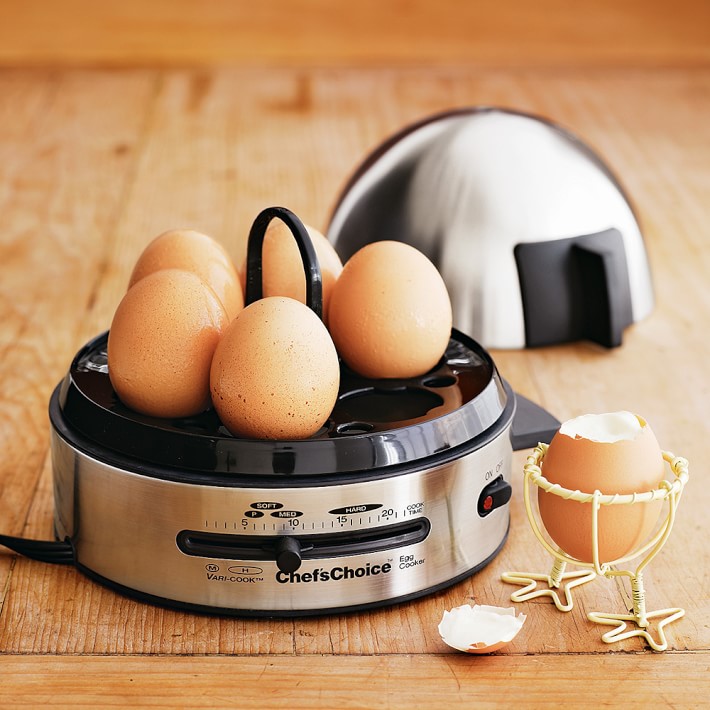The Ultimate Guide to Egg Cookers: Convenience, Types, Benefits, and More

eggs are a staple in many diets. However, achieving the perfect egg can sometimes be a challenge, particularly when it comes to boiling them to the desired level of doneness. This is where egg cookers come in, offering a convenient and efficient solution to egg preparation. This article explores the different types of egg cookers, their benefits, how to use them, and tips for selecting the best one for your kitchen.
What is an Egg Cooker?
An egg cooker is an electric kitchen appliance designed specifically for cooking eggs. It simplifies the process of boiling eggs to perfection by using steam or water to cook them evenly. Some models also offer additional features, such as poaching eggs, making omelets, and even steaming vegetables. With an egg cooker, you can save time and reduce the guesswork involved in boiling eggs on the stovetop.
The History of Egg Cookers
Egg cookers emerged as a kitchen innovation in the late 20th century when manufacturers began to recognize the need for specialized appliances to simplify food preparation. The first egg cookers were basic, offering simple boiling capabilities. However, as technology advanced, so did the features of egg cookers. Modern egg cookers come equipped with timers, multiple cooking settings, and even digital displays, making them more user-friendly and versatile.
Benefits of Using an Egg Cooker
- Consistent Results: One of the primary advantages of using an egg cooker is the consistency it provides. Whether you prefer soft-boiled, medium-boiled, or hard-boiled eggs, an egg cooker can help you achieve your desired level of doneness every time.
- Time-Saving: Cooking eggs on the stovetop can require constant attention to prevent overcooking. An egg cooker allows you to set it and forget it, freeing you to focus on other tasks in the kitchen.
- Ease of Use: Most egg cookers feature simple one-button operation and clear instructions, making them accessible for cooks of all skill levels. This is particularly beneficial for beginners or those who may not be confident in their cooking abilities.
- Versatility: Many egg cookers offer multiple cooking functions, including boiling, poaching, and even making omelets. This versatility makes them a valuable addition to any kitchen.
- Energy Efficiency: Compared to boiling eggs on the stovetop, egg cookers often use less energy, making them a more environmentally friendly option for cooking.
Types of Egg Cookers
Egg cookers come in various types, each designed to meet different cooking needs and preferences. Below are the main types of egg cookers available on the market:
- Steam Egg Cookers: These devices use steam to cook eggs. They typically have a water reservoir that heats up to create steam, cooking the eggs evenly. Steam egg cookers are known for their ability to achieve perfect results without the risk of overcooking.
- Electric Egg Cookers: These are electric appliances that can cook eggs in various ways, including boiling, poaching, and making omelets. They often feature settings for different levels of doneness and can accommodate multiple eggs at once.
- Microwave Egg Cookers: These cookers are designed for use in the microwave, allowing for quick egg preparation. They typically have a special design that helps to evenly cook eggs in the microwave, resulting in poached or scrambled eggs in a matter of minutes.
- Multi-Functional Cookers: Some egg cookers come with multiple cooking functions beyond eggs. These versatile appliances can also steam vegetables, cook rice, or prepare other dishes, making them suitable for various cooking needs.
- Stovetop Egg Cookers: These are traditional egg cookers designed to be used on the stovetop. They usually have a water reservoir that creates steam and are a good option for those who prefer not to use electric appliances.
How to Use an Egg Cooker
Using an egg cooker is typically straightforward, but the exact steps may vary depending on the model. Here is a general guide on how to use a typical electric egg cooker:
- Preparation:
- Gather the eggs you want to cook.
- Depending on your preference, you may want to pierce the larger end of each egg with an egg piercer (some cookers come with this tool) to prevent cracking during cooking.
- Measure Water:
- Refer to the instruction manual to determine how much water to add to the cooker for your desired level of doneness (soft, medium, or hard-boiled).
- Load the Eggs:
- Place the eggs in the designated tray or holder, ensuring they are secure and not touching each other.
- Cover and Start:
- Close the lid of the egg cooker and plug it in. Press the start button, if applicable.
- Wait:
- The egg cooker will automatically turn off once the eggs are done. Some models will emit a sound or signal to let you know.
- Cool and Serve:
- Carefully remove the eggs (they will be hot!) and transfer them to a bowl of ice water to stop the cooking process. Once cooled, peel and enjoy!
Choosing the Right Egg Cooker
When selecting an egg cooker, consider the following factors to ensure you choose the best one for your needs:
- Capacity: How many eggs do you typically cook at once? If you often prepare meals for a family, look for a cooker with a larger capacity.
- Features: Consider what features are most important to you. Do you want the ability to poach eggs or make omelets? Some cookers offer multiple cooking functions, while others focus solely on boiling eggs.
- Size and Design: Evaluate the size and design of the cooker. Ensure it fits your kitchen space and is easy to store when not in use.
- Ease of Use: Look for a model with straightforward controls and a clear instruction manual. User-friendly features can enhance your cooking experience.
- Material and Durability: Choose an egg cooker made of high-quality materials that can withstand regular use. Stainless steel and BPA-free plastic are common options.
- Price: Egg cookers are available at various price points. Set a budget and choose a model that offers the best features and quality within that range.
Popular Brands of Egg Cookers
Several brands have established themselves as leaders in the egg cooker market, each offering unique features and designs. Here are a few notable brands:
- Cuisinart: Known for high-quality kitchen appliances, Cuisinart offers a range of egg cookers with versatile features and sleek designs.
- Dash: Dash specializes in compact, colorful kitchen gadgets. Their egg cookers are often praised for their user-friendly design and affordability.
- Hamilton Beach: This brand offers reliable and budget-friendly egg cookers that deliver consistent results, making them a popular choice among consumers.
- Chefman: Chefman egg cookers are known for their multifunctional capabilities, allowing users to boil, poach, and even steam vegetables.
- Nostalgia: Nostalgia offers retro-style egg cookers that add a fun aesthetic to your kitchen while delivering reliable performance.
Tips for Cooking Eggs Perfectly
To maximize your egg cooker experience, consider these tips for cooking eggs perfectly:
- Adjust Water Levels: Different types of eggs may require varying water levels for optimal cooking. Experiment with water amounts to find what works best for you.
- Use Fresh Eggs: Fresh eggs generally peel more easily after cooking. If you’re using older eggs, consider adding a little vinegar to the cooking water to help with peeling.
- Ice Bath: After cooking, transferring eggs to an ice bath can help stop the cooking process and make peeling easier.
- Cleaning: Regularly clean your egg cooker according to the manufacturer’s instructions to keep it in good condition and ensure the best performance.
- Try Different Cooking Methods: If your egg cooker has multiple functions, experiment with different cooking methods, such as poaching or making omelets, to discover new favorites.
Conclusion
Egg cookers are a fantastic addition to any kitchen, simplifying the process of preparing eggs and providing consistent results. With various types available, each offering unique features and benefits, there’s an egg cooker to suit every cooking style and preference. By choosing the right model, mastering its use, and following tips for perfect egg cooking, you can enjoy delicious, perfectly cooked eggs with ease. Whether you prefer soft-boiled eggs for breakfast, hard-boiled eggs for snacks, or poached eggs for brunch, an egg cooker can help you achieve egg-cellent results every time.





